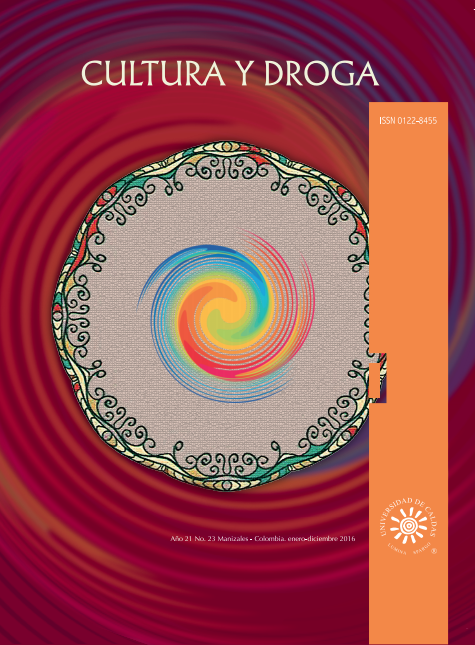Authors
Abstract
Objective. To investigate, from the symbolic interactionism, the mothers' perception of children participating in the "Abriendo Caminos Program" of the Ministry of Social Development of the Chilean Region of the Libertador Bernardo O'Higgins on the risks and opportunities for their children to decriminalize auto-cultivation of marijuana, as well as the consequences of this in their family trajectories. Methodology. The present research is qualitative descriptive exploratory section. This research is based on interviews with 14 women between January and March 2015. Results and Conclusions. As main conclusions are drawn, the danger that the participants in the dynamic father-children visualize due to the presence of the plant inside the home and the negative familiarization that this income entails for the children and the roles of its members; Which would favor antisocial and criminal trajectories such as those of their parents; All because of a story that contrasts with the vision of freedom and equality that proclaim other socially observable speeches.
References
Badiou, A. (2013). Veinticuatro notas sobre el uso de la palabra pueblo. En González, C. y Rodríguez, F. (Ed.). ¿Qué es pueblo? (pp. 9-18). Santiago de Chile, Chile: LOM.
Baudrillard, J. (1969). El sistema de los objetos. Ciudad de México, México: Siglo XXI editores.
Bourdieu, P. (1992). El sentido práctico. Madrid, España: Taurus.
Bourdieu, P. (2002). La distinción, criterio y bases sociales del gusto. Madrid, España: Taurus.
Bourdin, J. (2010). Invisibilidad social como violencia. Universitas Philosophica, 54 (27), 15-33.
Da Silva, F. & Forselledo, A. (1990). Familia y riesgo de farmacodependencia: aspectos funcionales y disfuncionales. Foro Boletín, 8, 12-32.
Galat, G. (2014). La tormenta perfecta. En Pion-Berlin, D. De represión a la legalización. Drogas: Uruguay, Chile, Argentina, Perú, México, Estados Unidos (pp.13-20). Santiago de Chile, Chile: Editorial Aún Creemos en los Sueños.
Lacan, J. (1953). Lo simbólico, lo imaginario y lo real. Buenos Aires, Argentina: Paidós.
Lamuedra, M. (2005). Bases teóricas para la reflexión sobre el significado social de la presencia de famosos y famosillos en televisión. Revista Comunicar, 25, 1-7.
López-Espinoza, L. (2013). Dirigentes y dirigidos. Astrolabio. Revista Internacional de Filosofía, 15, 1-11.
Marx, K. (1946). El Capital. Ciudad de México, México: Fondo de Cultura Económica.
Montero, M. (2004). Procesos psicosociales comunitarios: introducción a la psicología comunitaria, desarrollo, conceptos y procesos. Buenos Aires, Argentina: Paidós.
Paige, R. (1991). Friedman y Szasz sobre la libertad y las drogas. Schaffer Library of Drug Policy, 17, 3-9.
Polet, F. (2014). Washington pierde su guerra contra las drogas. En Pion-Berlin, D. De represión a la legalización. Drogas: Uruguay, Chile, Argentina, Perú, México, Estados Unidos (pp. 21-27). Santiago de Chile, Chile: Editorial Aún Creemos en los Sueños.
Poulantzas, N. (1977). Las clases sociales en el capitalismo actual. Ciudad de México, México: Siglo XXI editores.
Quijano, A. (2000). Colonialidad de poder, eurocentrismo y América Latina. En Lander, E. (Comp.). Colonialidad del saber, eurocentrismo y ciencias sociales (pp. 25-35). Buenos Aires, Argentina: CLACSO, UNESCO.
Rivacoba, M. (2002). Las sucesivas leyes chilenas sobre estupefacientes en la ruta progresiva del autoritarismo. Gran criminalidad y tráfico de estupefacientes. Santiago de Chile, Chile: Editorial Jurídica Conosur.
Romero, A. (2013). Consumo de drogas: del metarrelato a la drogomaterialidad. Virajes, 15 (2), 137-156.
Salazar, G. (1998). De la participación ciudadana: capital social constante y capital social variable. Proposiciones, 4, 12-34.
Schutz, A. (1995). La construcción significativa del mundo social. Buenos Aires, Argentina: Paidós.
Williams, J. and Skeels, C. (2006). The Impact of Cannabis and Law Reform. Agenda, 8 (4), 321-323.
Yüel, M. et al. (2008). Regional Brain Abnormalities Associated with Long Term Heavy Cannabis. Archive Genetic Psychiatry, 65, 694-701.

 PDF (Español)
PDF (Español)
 FLIP
FLIP

















